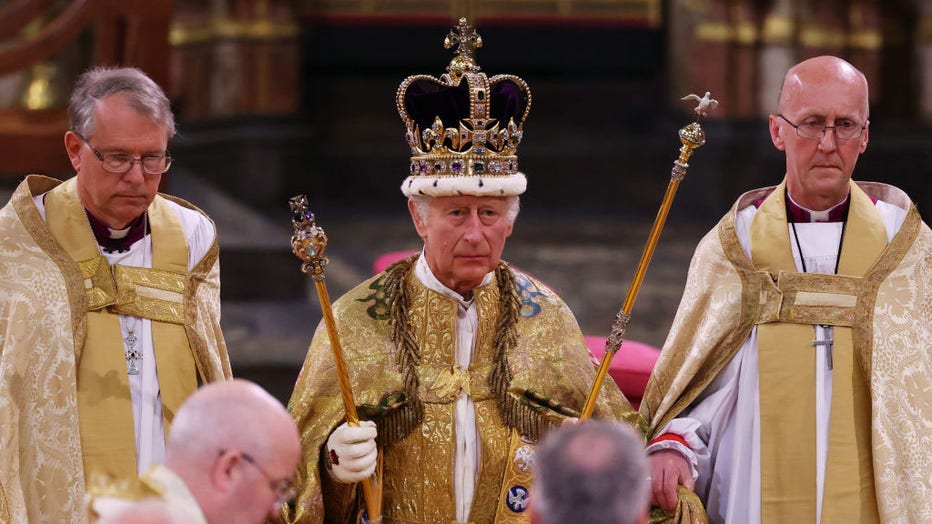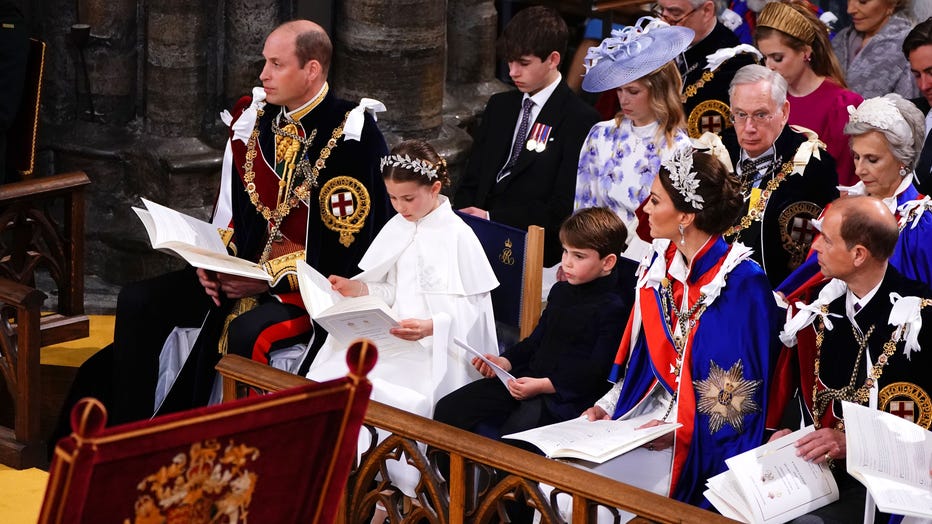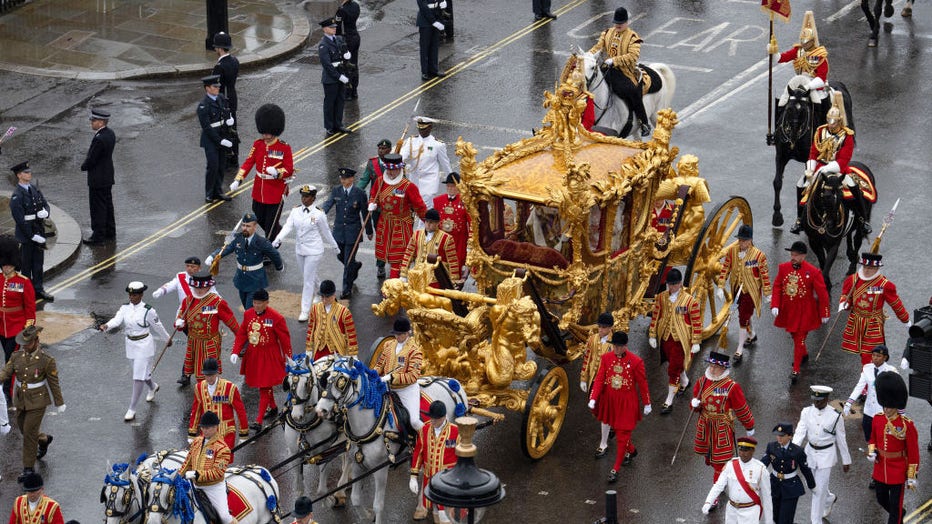King Charles III coronation: Scenes from this historic event
LONDON - After months of anticipation, the coronation of King Charles III finally happened Saturday. The momentous event, which hasn’t taken place in 70 years, was one of the largest and most elaborate royal ceremonies in recent history, drawing in crowds from all around the world.
The coronation of King Charles has been in the works for several years, with preparations beginning well before the passing of his mother, Queen Elizabeth II, who died last September.
King Charles III coronation details
The coronation was held on May 6, 2023 at Westminster Abbey in London. The ceremony was presided over by Justin Welby, the Archbishop of Canterbury, who crowned King Charles with the famous St. Edward's Crown.

King Charles III stands after being crowned during his coronation ceremony in Westminster Abbey, on May 6, 2023 in London, England. (Photo by Richard Pohle - WPA Pool/Getty Images)
But first, King Charles and his wife Camilla had to get to the ceremony.
That began with a procession to Westminster Abbey, which got started in the U.S. at about 5 a.m. Eastern Standard Time; 2 a.m. for viewers on the West Coast.
The official coronation began at 11 a.m. British Standard Time, which was 6 a.m. on the U.S. East Coast.

(Left to right 1st row) Prince William, Prince of Wales, Princess Charlotte, Prince Louis, Catherine, Princess of Wales and the Duke of Edinburgh at the Coronation of King Charles III and Queen Camilla on May 6, 2023 in London, England. (Photo by Yui
More than 100 heads of state were in the audience, but President Joe Biden kept with U.S. tradition and did not attend, as no American president has ever attended a British coronation.

Coronation: King Charles III crowned
King Charles III was crowned with the 360-year-old St. Edward?s Crown, marking the culminating moment of the coronation service. The coronation also marks the only time the King will wear this crown during his reign.
Instead, First Lady Jill Biden was at the coronation and spent much of Friday with the prime minister's wife before Saturday's big event. She will return to Washington on Sunday.
RELATED: Westminster Abbey: A history of England's famous royal church
"Headed to the U.K. for the Coronation of King Charles III – the first in 70 years!," Jill Biden tweeted before her flight Thursday to London. "It's an honor to represent the United States for this historic moment and celebrate the special relationship between our countries."
Queen Elizabeth II's coronation was the first coronation to be televised 70 years ago.
The celebration continues on Sunday with the Coronation Concert, but U.S. audiences won't be able to watch headliners Lionel Richie and Katy Perry. That will be shown on BBC's iPlayer, which isn't available outside the U.K.
King Charles III route

King's Coronation: King Charles III departs Buckingham Palace
King Charles III and Queen Consort Camilla depart Buckingham Palace en route to Westminster Abbey in the King's Procession, winding through the streets of London down in the Diamond Jubilee State Coach.
The coronation procession began at Buckingham Palace, where King Charles traveled by carriage through the streets of London, accompanied by members of the royal family, military representatives, and other dignitaries.
The procession drew large crowds, with many people hoping to catch a glimpse of the newly crowned king.
King Charles and Camilla, the queen consort, rolled out of Buckingham Palace in the horse-drawn gilded black Diamond Jubilee State Coach built for Elizabeth's 60th anniversary. It has heat, air conditioning, power windows and a suspension system that will provide a comfier ride than his mother's accommodations for her enthronement.

King Charles, Camilla arrive at Westminster Abbey
King's Coronation: Watch as King Charles III and Queen Consort Camilla arrive at Westminter Abbey for the Coronation Service.
RELATED: King Charles III's coronation: 3 crowns, 2 carriages and a shorter route
This time, King Charles planned to take a shortcut and smoother ride to Westminster Abbey for his coronation, trimming the procession route his mother took in 1953.
The route was 1.3 miles and went through Admiralty Arch; past Trafalgar Square and a statue of Charles I, the monarch beheaded in 1649; and by the houses of Parliament before arriving for the 11 a.m. religious service.
Unlike the 5-mile route Elizabeth and her husband Prince Philip took around London in 1953, King Charles and Camilla will return the way they came, but in a 260-year-old carriage used in every coronation since William IV’s in 1831.

King Charles III and Queen Camilla travelling in the Gold State Coach built in 1760 and used at every Coronation since that of William IV in 1831sets off from Westminster Abbey on route to Buckingham Palace during the Coronation of King Charles III a
King Charles III ceremony
King Charles aimed for a more modest event that included some modern touches, Buckingham Palace said ahead of the historic ceremony. The coronation was expected to reflect that with a shorter, less extravagant ceremony than the three-hour service for Elizabeth II.
A gospel choir performed a newly composed "Alleluia," and, for the first time, female clergy took part in the ceremony.
It was also the first to include representatives of the Buddhist, Hindu, Jewish, Muslim, and Sikh faiths.
In an ancient display of kingly power, Charles was anointed with oil from the Mount of Olives in the Holy Land and presented with an orb, swords and scepters, before Archbishop of Canterbury Justin Welby placed the solid gold crown bedecked with more than 400 precious stones on the monarch’s head.

Coronation of King Charles III: The Anoiting
King Charles III is anointed during his coronation service at Westminster Abbey. This part is the most solemn and sacred, the central act of the religious ceremony. The moment takes place behind the anointing screen, designed by iconographer Aiden Hart, protects the privacy of the moment.
As trumpets sounded, gun salutes were fired across the U.K.
The ceremony was steeped in ancient traditions and adorned with royal regalia from the Crown Jewels.

17th Century St Edward's Crown is carried ahead of the Coronation of King Charles III and Queen Camilla on May 6, 2023 in London, England. The Coronation of Charles III and his wife, Camilla, as King and Queen of the United Kingdom of Great Britain a
The crown features a 4.9-pound solid gold frame set with rubies, amethysts, sapphires, garnets, topazes and tourmalines and has a purple velvet cap and ermine band. It was worn by Elizabeth during her coronation and has been refitted for her son.
At the end of the ceremony, Charles switched to the lighter Imperial State Crown for the procession back to the palace.

King Charles III takes coronation oath
King Charles III made the coronation oath, and also became the first monarch to pray aloud at his coronation service.
Also towards the end of the ceremony, Prince William, Prince of Wales, knelt before his father and pledged loyalty to the king — before kissing him on the cheek.

God Save The King: Coronation of King Charles III
The British National Anthem, God Save The King, plays as King Charles III and Queen Camilla depart Westminster Abbey to begin the Procession of the King and Queen following the coronation service.
King Charles III salute and balcony appearance
After the ceremony, thousands of military troops that marched through London in King Charles III’s coronation procession saluted their commander in chief on the lawn of Buckingham Palace.
The troops removed their caps and gave three rousing cheers to the newly crowned king and Queen Camilla who watched from a perch looking over the palace gardens.
"Hip, hip, hooray," the servicemembers shouted three times.

Coronation: King Charles III receives Royal Salute
King Charles III receives the Royal Salute outside Buckingham Palace following the coronation service.
Bagpipers then played a tune written for the occasion called "King Charles III."
Moments later, King Charles III, Queen Camilla and members of the royal family appeared on Buckingham Palace’s balcony to greet a cheering crowd.
The royal couple were flanked by Charles’ son and first in line to the throne, Prince William, his wife Kate, and their children. Also on the balcony were two of Charles’ siblings, Princess Anne and Prince Edward.
Thousands of well-wishers ran onto the Mall, the grand avenue leading up to Buckingham Palace, to get as close as possible and get a glimpse of the royal appearance.
The crowds appeared jubilant despite the pouring rain, clamoring to get the best spot in front of the palace.

King Charles III makes first balcony appearance as monarch
King Charles III and Queen Camilla were joined by members of the Royal Family in their first balcony appearance at Buckingham Palace following the coronation. Their appearance included a flypast by the iconic Red Arrows.
The Red Arrows, the Royal Air Force’s aerobatics team, wowed the crowds as they flew past and left red, white and blue trails in the sky.
Worldwide reaction
For some, the event affirms the ties that bind Britain and its former colonies. But for many others in the Commonwealth, a group of nations mostly made up of places once claimed by the British Empire, Charles’ coronation is seen with apathy at best.
In those countries, the first crowning of a British monarch in 70 years is an occasion to reflect on oppression and colonialism’s bloody past. The displays of pageantry in London will jar especially with growing calls in the Caribbean to sever all ties with the monarchy.
RELATED: King Charles’ coronation draws apathy, criticism in former British colonies
"Interest in British royalty has waned since more Jamaicans are waking to the reality that the survivors of colonialism and the holocaust of slavery are yet to receive reparatory justice," the Rev. Sean Major-Campbell, an Anglican priest in the Jamaican capital, Kingston, said.
The coronation is "only relevant in so far as it kicks us in the face with the reality that our head of state is simply so by virtue of biology," Major-Campbell added.
This story was reported from Los Angeles. The Associated Press contributed.

